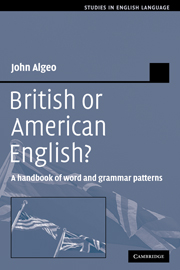Book contents
- Frontmatter
- Contents
- Preface
- Acknowledgments
- Introduction
- Part I Parts of Speech
- 1 Verbs
- 2 Determiners
- 3 Nouns
- 4 Pronouns
- 5 Adjectives
- 6 Adverbs
- 7 Qualifiers
- 8 Prepositions
- 9 Conjunctions
- 10 Interjections
- Part II Syntactic Constructions
- Bibliography of British book citation sources
- Bibliography of studies, dictionaries, and corpora
- Index of words
- Frontmatter
- Contents
- Preface
- Acknowledgments
- Introduction
- Part I Parts of Speech
- 1 Verbs
- 2 Determiners
- 3 Nouns
- 4 Pronouns
- 5 Adjectives
- 6 Adverbs
- 7 Qualifiers
- 8 Prepositions
- 9 Conjunctions
- 10 Interjections
- Part II Syntactic Constructions
- Bibliography of British book citation sources
- Bibliography of studies, dictionaries, and corpora
- Index of words
Summary
Derivation
The derivation of words of one part of speech from those of another is universal. In Modern English, it has been common to make such derivation without an overt signal in the stem of the word, but rather merely by shifting it to a new part of speech. This is a common feature of English, but the particular items so shifted may be characteristic of one or the other variety of the language.
From verbs
Some British nouns are derived from verbs.
By simple functional shift
The derivation may be a simple shift of the function of a verb form to noun use by analogy with many others of that type in English, for example, to strike is to a strike as to go slow is to a go-slow.
barrack Jeering: MW does not enter the noun but labels the verb chiefly British. <1949 P. Newton High Country Days 46 The other four, full of noisy barrack, were playing pitch and toss with a set of old horse shoes.> OED s.v. barrack n.
bathe Swim: MW labels it British. <Tomorrow a bathe in the cold north sea.> 1991 Greenwood 11.
brush Brushing (of the hair): CIC has 2.4 iptmw of the noun in collocation with hair in British texts and 0.8 iptmw in American texts. “Your hair wants a good brush” (Swan 1995, 615).
capsize CIC has 1.1 iptmw of a/the capsize in British texts and none in American. <Increasing the metacentric height of the intact ro-ro would do little to make her safer against capsize.> 1987 June 15 Times 11/3.
[…]
- Type
- Chapter
- Information
- British or American English?A Handbook of Word and Grammar Patterns, pp. 69 - 106Publisher: Cambridge University PressPrint publication year: 2006



